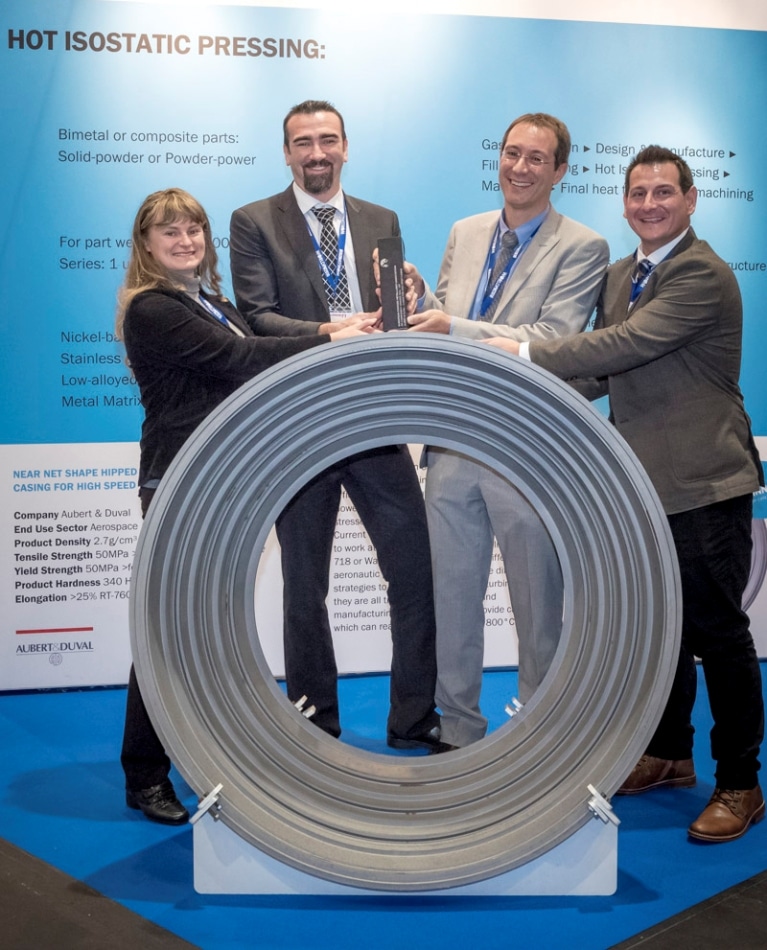Apr 21 2017
 Credit: Politecnico di Torino
Credit: Politecnico di Torino
A research team of Politecnico di Torino coordinated European Project, which has been awarded with the 3rd prize in the Reducing the Emissions and Enhancing Performances of Aeronautic Engines contest promoted by the JTI Clean Sky 1 European Framework.
The Clean Sky 1 European Research Program focuses on “The reduction of CO2 and NOx emissions and of the noise in the aeronautic sector”. Dealing with this idea the JTI Clean Sky project GETREADY “High speed turbine casing produced by powder HIP technology”, coordinated by the Consorzio Interuniversitario Nazionale per la Scienza e Tecnologia dei Materiali (INSTM) through a research unit of Politecnico di Torino, was awarded with the 3rd prize within the Award for the Best Project from Partners and Consortia.
Prof. Sara Biamino and Prof. Daniele Ugues, coordinators of the project and working in the Department of Applied Science and Technology (DISAT), received the prize in Brussels, during the Clean Sky 1 Closing Event (21-22 March 2017 - ‘Europe, Innovation and Aviation – Are we keeping up?’), on behalf of the whole Consortium including also the French company Aubert&Duval, the research unit of Politecnico di Milano coordinated by Prof. Stefano Beretta and the company Avio Aero of Rivalta Torinese, acting as Topic Manager.
The project showcased how, through the engineering of materials, of their heat treatment and manufacturing processes, it is indeed possible to design and develop components with increased efficiency, capable to work in intense conditions, higher than in the present working mode and, at the same time, safeguarding the waste of raw materials that are valuable.
In the framework of the project, the Net Shape Hot Isostatic Pressing (NSHIP) technology was employed to develop an aeronautic turbine casing using a Nickel superalloy. It is not possible to use this particular material to fabricate the same component through standard manufacturing routes as this material has poor forgeability. The NSHIP process actually begins with powders of the selected material, followed by inserting them into a capsule and then attaining the final component densification via the application of 1200 °C and ca. 1000 bar. Full densification of the component respecting the designed profile is obtained with the help of the pressure application mode. Fabrication of two real scale demonstrator casings took place via such technology within the GETREADY project. Additionally, the optimization of the heat treatment cycle for this specific material and particular forming process resulted in hot mechanical properties that were higher than those of the current reference employed for this application. This helped overcome technical problems that were not tackled till now. Furthermore, dealing with the raw materials savings, the proposed solution enabled fabricating a 90 kg casing with a raw material usage rate of 75% versus the only 13% rate typical of the traditional manufacturing route. Nickel superalloys are costly raw materials that are also characterized by critical supplying, since further to Ni they also comprise of an increased amount of several other valuable elements. Thus, a major environmental benefit is obtained with such a high raw material usage rate.
As a further confirmation of the technical significance of the achieved results, in October 2016 in Hamburg (Germany), the demonstrator casing produced within the project was already awarded by the European Association of Powder Metallurgy (EPMA) with the 1st prize for the best “Hot Isostatic Pressing Part of the Year”.